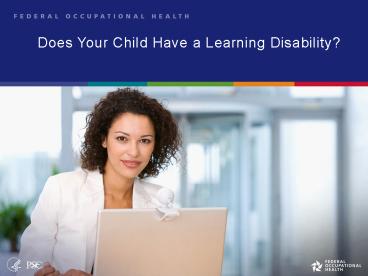Does Your Child Have a Learning Disability? - PowerPoint PPT Presentation
1 / 16
Title:
Does Your Child Have a Learning Disability?
Description:
Does Your Child Have a Learning Disability? Objectives What is a learning disability? Common symptoms Testing and diagnosing Individualized Education Plans (IEPs ... – PowerPoint PPT presentation
Number of Views:182
Avg rating:3.0/5.0
Title: Does Your Child Have a Learning Disability?
1
Does Your Child Have a Learning Disability?
2
Objectives
- What is a learning disability?
- Common symptoms
- Testing and diagnosing
- Individualized Education Plans (IEPs)
- Legal rights
- Strategies for success
- Your objectives
3
- What is a Learning Disability?
4
Learning Disabilities
- Spoken language
- Written language
- Mathematics
- Reasoning
- Memory
5
Common Symptoms Preschool
- A preschooler with a possible learning disability
may - Begin talking later than peers
- Have trouble finding the right words when talking
- Have difficulty following instructions
- Display extreme restlessness
- Interact inappropriately with peers
- Have significant coordination problems
6
Common Symptoms Elementary School Aged Children
- The symptoms of a learning disability may become
more obvious at the elementary level, he/she may - Have difficulty learning the connection between
letters and sounds - Confuse simple words
- Transpose numbers or letters
- Have difficulty following simple directions
- Be impulsive and lack planning skills
- Have excessively poor handwriting and/or trouble
gripping a pencil effectively - Have difficulty understanding the concept of time
7
Common Symptoms Middle And High School Aged
Children
- As school work becomes more demanding, a child in
middle or high school may exhibit any of the
previous symptoms plus some of the following - Inability to follow lectures and/or take
effective notes - Difficulty organizing written material
- Trouble comprehending reading material
- Frustration with learning foreign languages
- Inability to understand math processes, such as
equations
8
Questions To Ask Yourself About Your Child
- When does my child typically display unusual
behavior? - How often does my child exhibit the behavior and
how long does it last? - Where does the behavior usually occur?
- Does my childs behavior seem to be influenced by
others? - Does my childs behavior seem to be influenced by
other factors?
9
Testing For A Learning Disability
- How to request testing for children
- Under the age of three
- Over three but not enrolled in school
- Enrolled in public school
- Enrolled in independent (private schools)
10
- Diagnosing a Learning Disability
11
What To Do If You Disagree With The Diagnosis
- You can request
- Other professionals (within the school or
district) be brought in to listen to your
concerns - Another evaluation by a private psychologist at
the expense of the school system - An administrative review of the process used to
evaluate your child, in which you will be able to
bring your concerns before the board of education - A due process hearing
12
- Individualized Education Plans (IEPS)
13
Academic Accommodations
- Extended time on exams
- Books on tape
- Auxiliary aids
- Educational resource room
- Study skills instruction
14
Strategies for Success
- Educate yourself and your child
- Identify helpful strategies
- Help your child develop self-advocacy skills
- Open the lines of communication
- Have your child evaluated on a regular basis
- Create routines for schoolwork
- Consider hiring a tutor
- Create an effective study space
- Create opportunities for success
- Keep the lines of communication open
- Listen to your child
- Help your child plan for the future
- Attend support groups and seek out other means of
support
15
Let WorkLife4You Make Your Life a Little Easier!
Contact WorkLife4You 24/7 1-877-WL4-NOAA
(1-877-954-6622) (TTY 800-873-1322) http//www.wo
rklife4you.com Look for the Member Login box
Not a registered member yet? Follow the Start
Now link and enter Registration Code noaa
15
15
16
(No Transcript)































